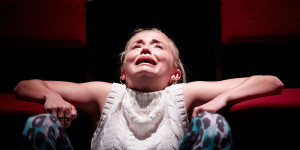How was the writer of Iphigenia in Splott to know that out of the blue (well, sort of red) it wasn’t an Effie or any woman (or man for that matter) from the less affluent parts of Cardiff who took up the cudgel for the increasingly dispossessed, but the millionaire former Voice of an Angel and now Voice of the Pissed Off, Charlotte Church? By the way, Splott is rather up-and-coming but maybe Iphigenia in Ely would have confused audiences outside our fair city.
Iphigenia in Splott is a good old fashioned morality play wrapped up in a loosely fitting agitprop hoodie and squeezed into the slightly too tight leggings of a Greek tale.
Sadly the answer to playwright Gary Owen’s appeal for social justice, the call to arms question posed by his anti-hero Effie at the end of the performance, was a massive vote of endorsement for the Conservative Government and its policy of cuts and further stigmatizing of the poor, the ill and the unemployed.
Marvellously directed by Rachel O’Riordan, who here shows what she really is made of and capable of, the remarkable performance by Sophie Melville, and I don’t gush normally, was truly stunning. Okay, so the accent slips from Kaardiff to ordinary normal English and back again, but, hey this is theatre and actresses don’t tend to have natural Splott accents. Similarly, she doesn’t really look like the face of working class, alcohol and drugs ridden underclass Britain, but the acting is so balls-grabbingly hard-hitting that this becomes totally a very minor point.
No, what we have is an actress who takes you by the throat and rips you along with her through the play and even some dork’s mobile phone destroying the tension does not put her off. She just pauses, holds her pose and waits for the idiot to leave the studio space, and resumes. Thank goodness it didn’t happen in the section of this one woman monologue when she is experiencing her life unravel through the lack of mobile phone calls or text messages.
There is no need to go through the plot which is a little predictable in part but then it sort has to be to follow the Iphigenia story and there were the odd moments when you thought “Nah, a Splott girl wouldn’t react like that” or that Gavin and Stacey’s Nessa would have just gone for chicken curry and chips in Caroline Street.
The Sherman studio was the perfect venue for this play which uses a few chairs and some strip lighting from designer Hayley Grindle and lighting designer Rachel Mortimer. Anything more would have detracted from the white knuckle inducing performance from Sophie Melville.
The most effective part of this play is the encounter where we drop the attempts to shock as a Chav and, rather, Effie reveals her inner damage and desperate need for meaning through self-sacrifice.
What happens to Effie provides the political catalyst for the playwright to turn the piece into a social justice, anti-austerity polemic, looping the “to the barricades” end back to the beginning when we are told of the effects of economic decline on the most vulnerable in former industrial cities.
Effie’s poetic description of light shining on broken glass on a grubby beach and her lyrical prose description of vomiting, combined with her analysis of the impact of economic policies on the working class, her analysis of class relations and societal conflict, would be gobsmackingly impressive were they spoken by the most educated, intellectually advanced, insightful, privileged Howells Girls School pupil. They are, of course, at odds with the girl from Splott no matter how brilliantly spoken, yelled, hissed and spine tingling hurled at we the audience. But isn’t didactic so-called working class drama ever thus?
I was also left feeling that this play was about the fate all of those who seek meaning in their life and find it in helping others, especially if that is at their own personal cost, whether financial, emotional or even, with some, physical. The class war basis of the play adds an extra dimension, that finding purpose and meaning is so much harder when you are barely surviving and even survival lacks meaning or purpose. But Effie’s struggle rises above and beyond such a narrow framing.
This is a performance that really should not be missed from an actress and director who have stamped their personalities and credential on the Cardiff stage. The run has been extended and while we may not rush to the barricades with Charlotte (Church, not royal princess) to demand social change we should plead for even more performances.
Sherman theatre, Cardiff, until 21 May and at the Pleasance King Dome, Edinburgh, from 24-30 August


very much enjoyed and respect your review